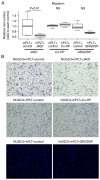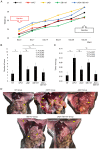Inhibition of cancer cell‑platelet adhesion as a promising therapeutic target for preventing peritoneal dissemination of gastric cancer
- PMID: 38020309
- PMCID: PMC10655057
- DOI: 10.3892/ol.2023.14125
Inhibition of cancer cell‑platelet adhesion as a promising therapeutic target for preventing peritoneal dissemination of gastric cancer
Abstract
Platelets form complexes with gastric cancer (GC) cells via direct contact, enhancing their malignant behavior. In the present study, the molecules responsible for GC cell-platelet interactions were examined and their therapeutic application in inhibiting the peritoneal dissemination of GC was investigated. First, the inhibitory effects of various candidate surface molecules were investigated on platelets and GC cells, such as C-type lectin-like receptor 2 (CLEC-2), glycoprotein VI (GPVI) and integrin αIIbβ3, in the platelet-induced enhancement of GC cell malignant potential. Second, the therapeutic effects of molecules responsible for the development and progression of GC were investigated in a mouse model of peritoneal dissemination. Platelet-induced enhancement of the migratory ability of GC cells was markedly inhibited by an anti-GPVI antibody and inhibitor of galectin-3, a GPVI ligand. However, neither the CLEC-2 inhibitor nor the integrin-blocking peptide significantly suppressed this enhanced migratory ability. In experiments using mouse GC cells and platelets, the migratory and invasive abilities enhanced by platelets were significantly suppressed by the anti-GPVI antibody and galectin-3 inhibitor. Furthermore, in vivo analyses demonstrated that the platelet-induced enhancement of peritoneal dissemination was significantly suppressed by the coadministration of anti-GPVI antibody and galectin-3 inhibitor, and was nearly eliminated by the combined treatment. The inhibition of adhesion resulting from GPVI-galectin-3 interaction may be a promising therapeutic strategy for preventing peritoneal dissemination in patients with GC.
Keywords: direct contact; gastric cancer; peritoneal dissemination; platelet; therapeutic application.
Copyright: © Nakayama et al.
Conflict of interest statement
The authors declare that they have no competing interests.
Figures




Similar articles
-
Molecular mechanisms driving the interactions between platelet and gastric cancer cells during peritoneal dissemination.Oncol Lett. 2024 Aug 13;28(4):498. doi: 10.3892/ol.2024.14631. eCollection 2024 Oct. Oncol Lett. 2024. PMID: 39211304 Free PMC article.
-
Galectin-9 activates platelet ITAM receptors glycoprotein VI and C-type lectin-like receptor-2.J Thromb Haemost. 2022 Apr;20(4):936-950. doi: 10.1111/jth.15625. Epub 2022 Jan 6. J Thromb Haemost. 2022. PMID: 34936188
-
Significant Hypo-Responsiveness to GPVI and CLEC-2 Agonists in Pre-Term and Full-Term Neonatal Platelets and following Immune Thrombocytopenia.Thromb Haemost. 2018 Jun;118(6):1009-1020. doi: 10.1055/s-0038-1646924. Epub 2018 Apr 25. Thromb Haemost. 2018. PMID: 29695020 Free PMC article.
-
Clinical significance of altered collagen-receptor functioning in platelets with emphasis on glycoprotein VI.Blood Rev. 2019 Nov;38:100592. doi: 10.1016/j.blre.2019.100592. Epub 2019 Jul 22. Blood Rev. 2019. PMID: 31351674 Review.
-
Targeting glycoprotein VI to disrupt platelet-mediated tumor cell extravasation.Pharmacol Res. 2022 Aug;182:106301. doi: 10.1016/j.phrs.2022.106301. Epub 2022 Jun 14. Pharmacol Res. 2022. PMID: 35710063 Review.
Cited by
-
Molecular mechanisms driving the interactions between platelet and gastric cancer cells during peritoneal dissemination.Oncol Lett. 2024 Aug 13;28(4):498. doi: 10.3892/ol.2024.14631. eCollection 2024 Oct. Oncol Lett. 2024. PMID: 39211304 Free PMC article.
-
Establishment of a novel small bowel adenocarcinoma cell line using patient‑derived xenografts, which produces CEA and CA19‑9.Oncol Lett. 2024 Jun 5;28(2):360. doi: 10.3892/ol.2024.14493. eCollection 2024 Aug. Oncol Lett. 2024. PMID: 38881709 Free PMC article.
-
Surgery with minimal bleeding.Ann Gastroenterol Surg. 2024 Jan 11;8(1):6-7. doi: 10.1002/ags3.12774. eCollection 2024 Jan. Ann Gastroenterol Surg. 2024. PMID: 38250681 Free PMC article. No abstract available.
-
Biomimetic nanocarriers in cancer therapy: based on intercellular and cell-tumor microenvironment communication.J Nanobiotechnology. 2024 Oct 6;22(1):604. doi: 10.1186/s12951-024-02835-4. J Nanobiotechnology. 2024. PMID: 39370518 Free PMC article. Review.
References
Grants and funding
LinkOut - more resources
Full Text Sources
Research Materials
Miscellaneous
